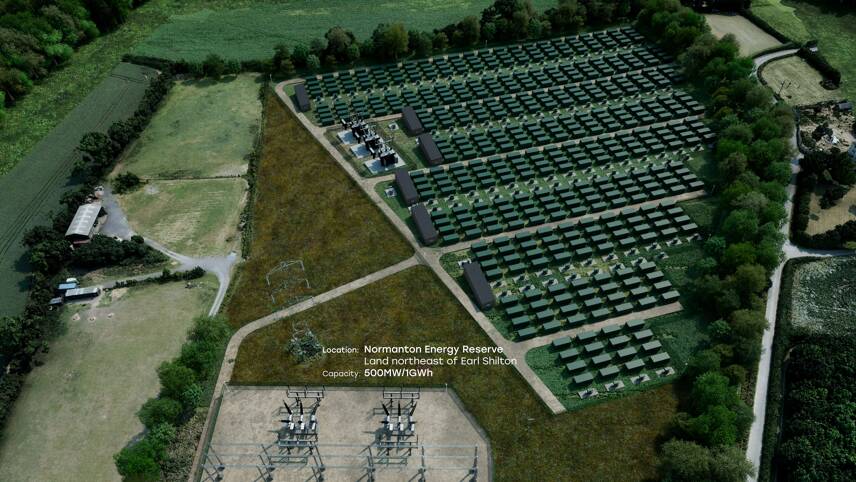Register for free and continue reading
Join our growing army of changemakers and get unlimited access to our premium content

The battery facility is part of the Normanton Energy Reserve project. Artist's impression pictured.
The battery facility is part of the Normanton Energy Reserve project which has received approval from Blaby District Council this week.
The £270m battery site is approximately ten times larger than most battery projects currently providing storage for the grid.
Upon completion of the project, the facility will be able to supply power to 235,000 homes for two hours and will be directly connected to the National Grid at a new substation, to maintain grid stability during increased electricity demand.
Exagen Development’s chief executive officer Jeremy Littman said: “For the UK to achieve its 2050 net-zero target at the lowest possible cost, there needs to be an increase in electricity storage capacity to balance renewable energy generation.
“As more renewables are deployed, larger battery projects like Normanton will be required. It is vital that they are developed sensitively and in partnership with the local communities that host them.”
According to the National Grid’s ‘Future Energy Scenarios’ report, approximately 35GW of storage capacity will be required in the UK to reach net-zero by 2050.
The Normanton Energy Reserve project, spanning across 19 acres of land, will alone equate to 1.4% of this national requirement.
Some 45% of the 19 acres will be set aside for biodiversity. Exagen is aiming for a 25% increase in biodiversity against the current baseline.
The approved plans will also focus on the extension of the Normanton Wood, one of The Woodland Trust’s woodlands created to commemorate the Millennium, as well as new wildflower meadows, land for beekeeping, new hedgerows and perimeter tree planting.
Local community participation
The land will be under the ownership of Exagen with a focus on local community participation. The company has set plans to establish a dedicated community fund to spend on local improvements.
Since June last year, Exagen has been sponsoring the nearby Thurlaston Junior Football Club.
The start of the project’s construction will deliver £250,000 for local projects and groups. Once operational, the project will be able to add £50,000 each year up to 40 years, which will amount to £4m. These funds will support local groups, community capital projects or skills and training.
Furthermore, Exagen aims to collaborate with local businesses for the construction of the main site.
Littman added: “We’ve been guided by our local stakeholders to achieve consent for a significant infrastructure project that is unobtrusive and balances national needs with local benefit.
“We’ll work now to deliver this project into operation in that same spirit of partnership, and as an active and useful member of the local community.”
From coal to solar
In related news, Bluefield Renewable Developments has received planning approval for its 49.9MW solar project in County Durham.
The farm will be constructed on a former coal mining site, situated north of Cockfield and southeast of the village of High Lands.
The solar farm is anticipated to produce enough electricity to supply power to approximately 13,000 homes every year while saving around 8,700 tonnes of carbon emissions annually.
According to Bluefield, the project will also contribute to a £400,000 community fund, in a bid to support local clean energy and energy efficiency efforts.
Bluefield Renewable Developments’ development director Alan Connolly said: “We are delighted to have secured planning permission for our Bluestone Solar Farm project.
“An area of land that was once used to extract fossil fuels that powered our industrial past, will now be utilised to produce significant and sustainable clean energy for the future.”


Please login or Register to leave a comment.